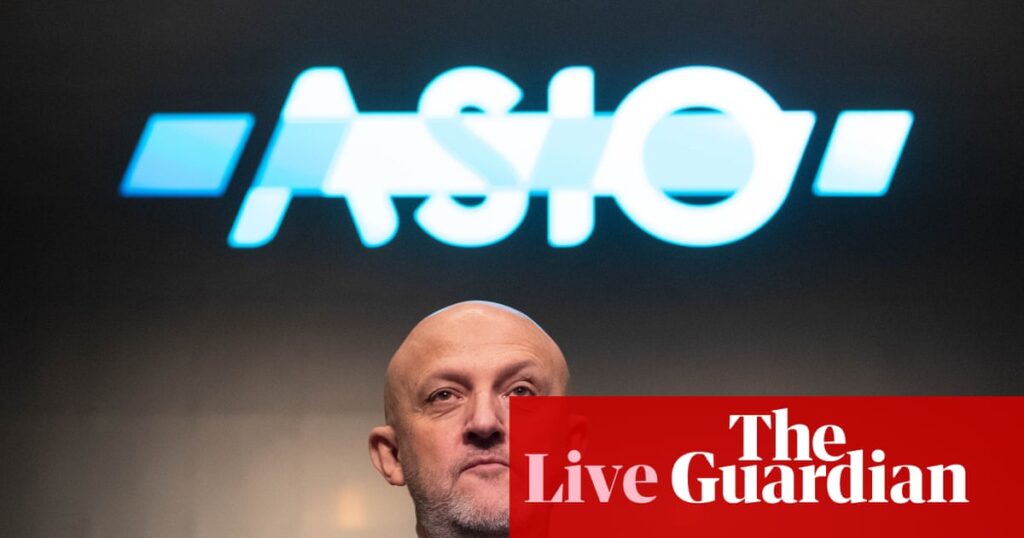Asio director says espionage activities against Australia cost $12.5bn each year
The Asio director general, Mike Burgess, is speaking after revealing in a major speech that foreign spies have a “very unhealthy interest” in the Aukus submarine deal. Burgess said intelligence operatives have disrupted 24 major espionage and foreign interference operations overall in the past three years, but placed the cost of such activities against Australia at $12.5bn each year.
He told RN Breakfast:
The problem with espionage, it’s highly secretive and hard to see or hard to measure, but actually engaging the Institute of Criminology in an attempt to cost it, to make the cost tangible, will help businesses and individuals understand this is a real threat. And more importantly, we spent some time saying what good security looks like and how they can help catch spies and stop this.
… All nations spy, including Australia, so we can’t forget that. So all governments look for covert or sensitive insights that are not publicly available. So all nations do it, and genuinely you would be surprised by who’s doing it.
Read more here:
Key events
And for good measure, the Newsroom edition of our Full Story podcast focuses on the Palestinian issue.
Reged Ahmad talks to deputy editor Patrick Keneally and head of newsroom Mike Ticher about Anthony Albanese’s decision to so far resist pressure pushing Australia towards Palestinian recognition.
NSW politicians share statement backing March for Humanity across Sydney Harbour Bridge
We’ve already mentioned Alex Greenwich’s support for Sunday’s March for Humanity across the Sydney Harbour Bridge – he’s among six NSW MPs in a 15-strong group of state politicians voicing their support for the protest and calling on the state government to allow it to proceed.
The other NSW MPs are Jacqui Scrubby, Linda Voltz, Kobi Shetty, Jenny Leong and Tamara Smith.
Leong and Voltz plan to join in person, while the other four said they are in full support, but unable to attend the event.
The MLCs who signed the statement, shared overnight, are Sue Higginson, John Ruddick, Cameron Murphy, Cate Faehrmann, Sarah Kaine, Abigail Boyd, Amanda Cohn, Anthony D’Adam and Stephen Lawrence. The statement reads:
We the undersigned members of the NSW Parliament support, and will attend, Sunday’s March for Humanity and Palestine across the harbour bridge.
We do so to signal in strong terms our disapproval of the ongoing starvation of Palestinian people and the destruction of Gaza and our commitment to the right to protest against it.
We call upon the NSW government to work with the organisers to facilitate a safe and orderly event, on Sunday 3 August, or on some other agreed date.
Thousands of people were expected to join the procession on Sunday to protest Israel’s war on the blockaded enclave, before police confirmed they would not permit it.
NSW police has taken court action to categorise it as unlawful and unauthorised, with the matter listed for 12.30pm today in the supreme court.
Burke says meeting with US FBI director ‘really good’
Burke spoke about the quiet meeting he held with US FBI director Kash Patel on Thursday. He told RN Breakfast the meeting was “really good”, describing it as “a great discussion of the different ways in which we keep people safe”. Burke went on:
There’s a whole range of issues we cooperate on, from things that people would think about in terms of counter-terrorism, but right through to some issues of foreign interference, but other issues of child protection. The cooperation is very real, very strong.
Tony Burke says Australia needs to be ‘clear-eyed’ about intelligence threats
Tony Burke, the minister for home affairs, said the government has invested more than $70m in the past four years to help combat espionage activities, but said Asio’s remarks were meant to recognise that bad actors were targeting Australia. He told RN Breakfast:
We need to be clear-eyed that there are people wanting to steal secrets, some of them government, some of them commercial. And when you’re clear-eyed about what’s happening, you can then sensibly take the measures to make it as hard as possible for them to do that.
Burke added the number of people mentioning their security clearances on social media had dropped since concerns were raised several years ago, noting:
For people who want to engage in espionage and foreign interference, their methods should not begin with a simple Google search to see who are the people who they would need.
Burgess says while money is lost, ‘tens of billions’ has been saved foiling foreign spies
Burgess said Asio was publicising the dollar value on the cost of espionage activities against Australia to help raise awareness about safety and security. He told RN Breakfast:
Whilst ($)12.5 is an imposing figure, actually, tens of billions of dollars have been saved. Saved by the good work that’s already being done. We’re just saying we need to do a little bit better because $12.5bn is still too high.
The Asio director general also said it was “reckless” that many Australians admitted on professional networking sites that they have access to sensitive or potentially classified information:
It is not naive, it’s recklessly inviting the intelligence, the intention of a foreign intelligence service. It’s OK to put what you’re doing on your CV if you’re applying for a job, you’ve got a right to do that. When you advertise it on a professional networking site or your social media profile, that’s just unwise and you are becoming a target.
Asio director says espionage activities against Australia cost $12.5bn each year
The Asio director general, Mike Burgess, is speaking after revealing in a major speech that foreign spies have a “very unhealthy interest” in the Aukus submarine deal. Burgess said intelligence operatives have disrupted 24 major espionage and foreign interference operations overall in the past three years, but placed the cost of such activities against Australia at $12.5bn each year.
He told RN Breakfast:
The problem with espionage, it’s highly secretive and hard to see or hard to measure, but actually engaging the Institute of Criminology in an attempt to cost it, to make the cost tangible, will help businesses and individuals understand this is a real threat. And more importantly, we spent some time saying what good security looks like and how they can help catch spies and stop this.
… All nations spy, including Australia, so we can’t forget that. So all governments look for covert or sensitive insights that are not publicly available. So all nations do it, and genuinely you would be surprised by who’s doing it.
Read more here:
Tim Ayers says government ‘at the table’ to see Glencore’s Mount Isa smelter stay open
Tim Ayres, the minister for industry, innovation and science, said this morning “everybody” has a responsibility to “commit, engage and make sure we’re investing in the future” as Glencore considers closing a smelting plant in Mount Isa, Queensland that supports thousands of jobs.
Prime minister Anthony Albanese spoke about the potential closure yesterday, saying Australia had been “good to Glencore,” adding “It’s about time Glencore is good back to Australia”. Ayres told RN Breakfast:
The message is that the same message for Glencore as it is for a range of these other smelters around Australia that are in challenging circumstances at the moment. That is, everybody’s got a responsibility to commit, engage, and make sure we’re investing in the future of this.
So we are engaged as the federal government, but it’s also about what state governments deliver, what the industry itself delivers, what the supply chain delivers, and the future of these capabilities and the owners themselves have an important role to play.
Ayers would not rule out assisting Glencore to keep the smelter open, saying there will be “focused and deliberate” discussions in the coming weeks.
We are absolutely at the table, absolutely engaged to understand what is the best future. Sustainable, competitive business here that can drive jobs and investment in North Queensland.

Nick Visser
Good morning, Nick Visser here to take you through the morning’s news. Let’s get to it.
NSW MP Alex Greenwich supports pro-Palestine Harbour Bridge march

Jordyn Beazley
The independent NSW MP Alex Greenwich supports the pro-Palestine protest planned for Sydney Harbour Bridge, saying it “would send a powerful global message”.
The march could still go ahead if the court sides with police, but protesters face being arrested under anti-protest laws.
Greenwich, the state MP for Sydney, said there could be a march across the bridge this weekend, saying “I know it can be done”. In a statement this morning he said:
Having successfully lobbied the previous Coalition government to allow a march across the Sydney Harbour Bridge in support of LGBTQ equality during Sydney WorldPride, I know it can be done.
I share the widespread community horror over what is happening in Gaza and support the use of the Sydney Harbour Bridge to march against the atrocities. This would send a powerful global message of our solidarity to stop the starvation of people in Gaza.
Greenwich said he had been in regular contact with police about the weekly pro-Palestine protests – which usually marches through the Sydney CBD and falls within Greenwich’s electorate – and said it has “consistently proven to be peaceful events with police and organisers working well together to ensure public safety”:
I hope organisers continue to work with police to ensure that these protests can continue safely and that agreement can be reached to allow a protest across the Sydney Harbour Bridge.

Jordyn Beazley
PM reiterates that Israel’s actions in Gaza are ‘not defensible’
Back to Albanese for a moment. He was also asked on ABC’s 7.30 last night if he considers it too late for “people in Gaza, especially children in terms of malnutrition and starvation in Gaza”. He said:
These are terrible circumstances. And they are completely unjustifiable and indefensible. I made that clear in discussions I directly had with President Herzog of Israel and I make public comments as well.
I think Australians all would want to see that never happen and we are deeply concerned. It is hard for us to get aid in and certainly the dropping of aid by air has not been enough. You need to open up fully access for aid into Gaza so as to save lives.
Asked if his conclusion was that Israel was using starvation as a weapon of war, he said:
Well, what I would say is that Israel’s actions are not defensible. When we passed a resolution in the parliament, we said very clearly Israel has a right to defend itself, but how it defends itself matters and it needs to comply with international law.
And when we see the substantial loss of innocent life, the deprivation that is occurring in Gaza, the fact is that Hamas, of course, with their actions on October 7, of course are responsible for engaging in terrorist activity, and the state of Israel of course responded by defending itself. But the figures that we’ve seen with the loss of innocent life and deprivation in Gaza are a human tragedy.
Asked if he was saying Israel is guilty of a war crime, Albanese said: “No, there’s processes to go through [to make] those sort of declarations.”
Garma festival begins
What began as a backyard barbecue and a “jam session” now attracts thousands of people to one of Australia’s most remote regions each year.
It has been 25 years since the annual Garma festival’s humble beginnings and the Yothu Yindi Foundation, which organises the event in north-east Arnhem Land, is paying homage to those who started it.
The location is the culturally significant ceremonial grounds of Gulkula, where each year art, song, bunggul (dance) and storytelling are showcased.
Garma has become an important policy forum, with Anthony Albanese, the Indigenous affairs minister, Malarndirri McCarthy, and other politicians slated to speak at the four-day festival.
These talks co-exist with discussions of culture, education and other significant issues for First Nations people.
The 2025 Garma theme is “rom ga waŋa wataŋu”, or “the law of the land, standing firm”, reflected the Yolngu fight for empowerment and land rights.
The two Australians who were on board a boat intercepted by Israel while trying to transport aid to Gaza last weekend were expected to arrive back in Sydney this morning.
We’ll bring you more details on that later, but you can read more about what happened to journalist Tania Safi and human rights activist Robert Martin here:
‘Want to make sure it’s not just a gesture’: PM holds firm on Palestinian recognition position

Jordyn Beazley
The prime minister said last night that Australia will only recognise a Palestinian state once it “can make a contribution to the creation of two states”.
Appearing on ABC’s 7.30 last night, Anthony Albanese was asked what had to change in order for Australia to recognise Palestinian statehood after Canada joined the UK and France’s announced they intended to do so at the UN General Assembly in September.
We will give consideration to all of the factors which are there. But I believe very strongly that the legitimate aspirations of the Palestinian people need to be realised, but in order for that to be achieved, there needs to also be security for the state of Israel.
Asked what’s stopping Australia from making a similar commitment to Canada, Albanese said: “We want to make sure it’s not just a gesture but it’s a positive contribution.”
Albanese was pressed on what exactly needs to change for his stance to change. He responded:
Well, it won’t be a personal decision, it will be a decision by the Australian government based upon the assessment that my fellow cabinet members will make … making that declaration will actually make a difference and be a positive step towards the realisation of the two-state goal.
Asked if Australia will recognise Palestine if the US doesn’t, he said: “We’ll make our own decisions.”
Welcome
Good morning and welcome to our live news blog. I’m Martin Farrer with the top stories this morning and then it’ll be Nick Visser to take you through to the weekend.
The question of whether Australia should join the UK, France and Canada in recognising a Palestinian state continues to dominate the federal politics picture this week after Anthony Albanese appeared on ABC’s 7.30 and defended his government’s stance to remain on the fence on the issue. Full details of what the prime minister said coming up.
The independent NSW MP Alex Greenwich has come out in support of the pro-Palestine protest planned for Sydney Harbour Bridge on Sunday, saying it “would send a powerful global message”. His support comes as the Palestine Action Group goes to the supreme court today to challenge a decision by police chiefs that the bridge should not be shut down to allow the march to go ahead. We’ll have more shortly.

